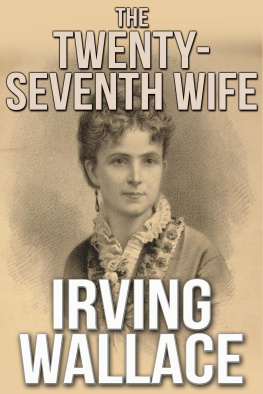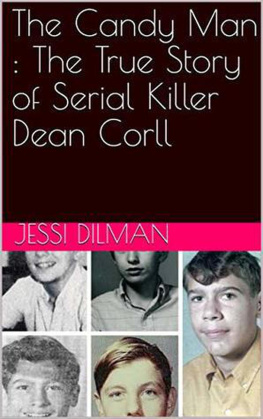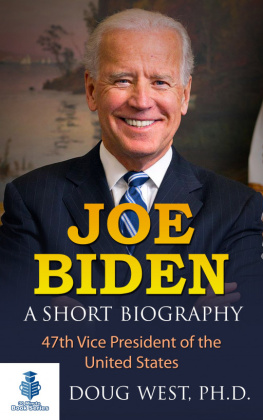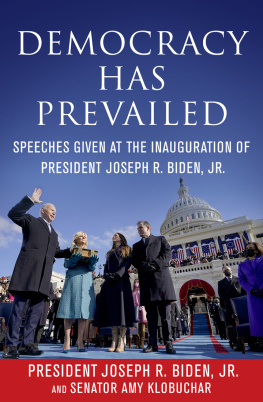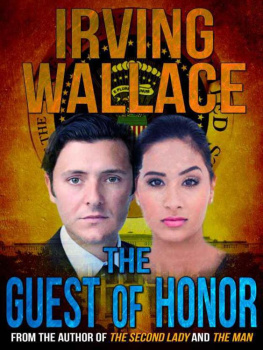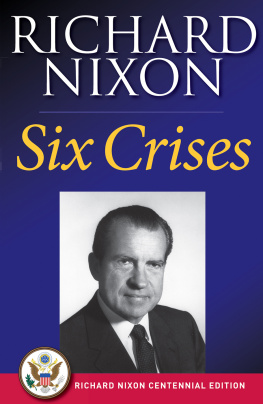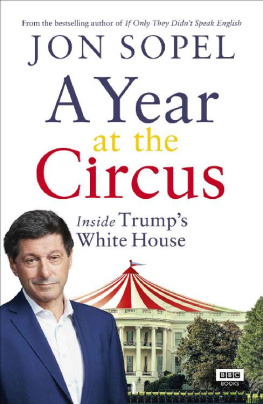
DEDICATED TO
Sylvia, David, and Amy
With Love
One of the authors prized possessions is an original autographed manuscript, written firmly with pen on cheap ruled paper, signed by a former Negro slave who became a great reformer, lecturer, writer, adviser to President Abraham Lincoln, United States Minister to Haiti, and candidate for Vice-President of the United States on the Equal Rights Party ticket in 1872. The manuscript reads as follows:
In a composite Nation like ours, made up of almost every variety of the human family, there should be, as before the Law, no rich, no poor, no high, no low, no black, no white, but one country, one citizenship, equal rights and a common destiny for all.
A Government that cannot or does not protect the humblest citizen in his right to life, Liberty and the pursuit of happiness, should be reformed or overthrown, without delay.
FREDERICK DOUGLASS
Washington D.C. Oct. 20. 1883
Irving Wallaces The Man is a prophetic novel, although not all the prophecies in his absorbing work of fiction have come true. The novel dramatizes the extraordinary events transpiring after the sudden death of a fictitious American president. Ironically Wallaces book, published in 1964, was completed in 1963 just nine weeks before the death of President John F. Kennedy. The Man also depicts a presidents impeachment trial, 35 years before the impeachment of President William Jefferson Clinton.
The new president who stands center stage in Wallaces drama is Douglass Dilman, a reserved former college professor with no fire in his belly for presidential politics. Tragedy thrusts him into the nations highest office, and fate inaugurates him as the first black President of the United States of America.
In 1972, it was my privilege to play Douglass Dilman in what was initially intended to be an ABC Television Movie of the Week, based on Irving Wallaces best selling novel. Whether he was writing fiction or nonfiction, Wallace had a passion for research. In 1963, as background for The Man, he accepted an invitation from President John F. Kennedy to spend several days observing life in the White House, from the Oval Office to the Cabinet Room to the private family quarters. As a result, his novel is grounded in authentic details, and even the Congressional newspaper, The Roll Call, praised the book for its understanding of government in all its importance, its pettiness, its complexities, vagaries, shortcomings and its greatness.
As I prepared to play The Man, I noted key elements in the novel that might be kept for the film, elements that might not be kept, and even elements that were not in the story at all, but might be added. This would be my first major film role since The Great White Hope in 1970. It gave me the chance to play a black man who was not a stereotype of a militant.
In those volatile days of the seventies, there was a general public insistence that a black man be militant. This seemed to be expected of black men by other black men, by white men, by liberals, and even by conservatives. There was the attitude, often liberal, that said, If I were a black man, I would sure as hell be screaming or angry. At the other end of the spectrum, there were those people, often conservative, who seemed to prefer stereotypes, saying, Give me a black man who is yelling and screaming and Ill know what to do with him.
Douglass Dilman, to the contrary, is a quiet, rational man trying his best to do a difficult job in daunting circumstances. Thrown into the center of a political earthquake, he is an apolitical creature, and something of a Milquetoast. He is an intellectual, and a good man with a commitment to principles but no appetite for political battles. His adversaries in the administration try to isolate Dilman, shutting him off in a corner so that they can run the government and leave him out of the loop.
I am not an intellectual and I dont think of myself as a Milquetoast, but Dilman is not unlike me. I am not saying that I was ideal casting, but a truly remarkable cast and crew were assembled around me to try to bring Wallaces novel to life on the television screen-Burgess Meredith, Martin Balsam, Barbara Rush, Anne Seymour, William Windom, and Lew Ayres, among others. Comedian Jack Benny opened the film in a cameo role.
Rod Serling, who enjoyed a huge success with The Twilight Zone, wrote the television screenplay, and Joe Sargent was our able, dynamic director. The script, the setting, the shooting schedule and the budget were all geared to television, and a television movie in those days, far more than today, was streamlined for the small screen-very low budget, modest salaries, and a quick production pace.
Certain creative decisions were made to compress Wallaces complex novel for the small screen, to take The Man and his friends and foes into American living rooms. As is often the case when a novel is the basis for a screenplay, liberties were taken with exterior details in the original story. Serling, exercising dramatic license, gave Dilman one child instead of two; emphasized racial conflict in South Africa rather than in the United States; and set up the climax of the drama at a political convention rather than an impeachment trial.
This was a time when television shows had to be very careful about the treatment of racial issues and themes. Otherwise some Southern states, including my native state of Mississippi, would refuse to air them. For the television script, the decision was made to eliminate the sensational issue of the impeachment of the first black President of the United States. His enemies had fought dirty and tried hard to get rid of him. In the novel, Dilman is charged with violating his oath of office, committing treason against the United States, obstructing justice, and demonstrating loose morals, intoxication, partisanship, and maladministration. He is even accused of raping his social secretary. At that time, I did not protest when this material was cut from the script.
In the film, a South African official is assassinated by a young African American, and a huge public outcry ensues when Dilman considers extraditing the young man. I went to Rod Serling and said, I find it a weakening factor in our drama that President Dilman does not meet one-on-one, face-to-face with representatives of the South African apartheid regime Irving Wallace seriously explored issues of African unity in the novel, and Dilmans meetings with President Kwame Amboko of the independent African democracy of Baraza form a very important facet of the story. When I urged Rod to consider this encounter, he said, No, Jimmy, that would be another story.
He didnt have the space or the time for that story for television, and that was a disappointment for me. From that point on, even though I enjoyed the story, the character I was playing, and the actors I was working with, I did not feel that we were achieving the full dramatic potential of The Man. I contended that if we were going to do justice to the story about the first black President of the United States, as Wallace did in his novel, we had to produce a far more powerful drama.
Additional decisions were made, however, to reflect the political climate of the early seventies We added an allusion to the 1968 assassination of Dr. Martin Luther King. In the novel, Dilmans daughter is passing for white, and his son is involved in a militant group. In the film, the new President has one child, a black militant daughter, and for that role, the producers hired a very dark, beautiful young actress who symbolized all the glamour of an American girl not passing for white. Halfway through the shooting, however, it was decided that she was not politically indicative enough. The producers replaced the first actress with Janet MacLachlan, a very accomplished stage actress, who resembled activist Angela Davis, Afro hair style and all-solidly indicative of the prototype they wanted in the movie.
Next page

